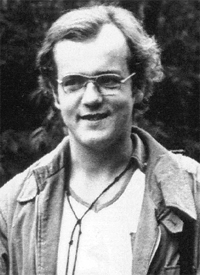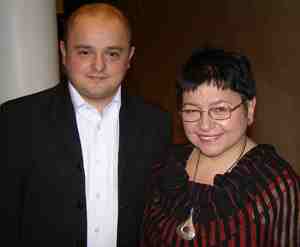 World
Accordion Day Concert - Andrzej Krzanowski in Memoriam World
Accordion Day Concert - Andrzej Krzanowski in Memoriam
The students of Academy of music in Gdansk presented a
concert on the 25th of May 2010, 5.30 PM at the Chamber
Hall of the Academy of Music in Gdansk.
The concert was dedicated to music of renonwed Polish
composer Andrzej Krzanowski, a composer and accordionist
who died 20 years ago. In addition to the performances,
the program also included a presentation on his life and
musical output presented by Prof. Elzbieta Rosinska.
The musicical program consitsted of the music of Andrzej
Krzanowski:
-
Prelude
(Michal Kosinski)
-
Chorale
(Zaneta Rutkowska)
-
Signal
(Pawel Ratajek)
-
Kathedral
(Edyta Kolibowska),
-
4th
Programme for reciter, siren, cymbals, accordion and
tapes (Szymon Chylinski - accordion & reciter, Pawel
Okuszko - percussion, Ariel Ludwiczak - tapes, Katarzyna
Chylinska - siren).
 Among
his hundreds of compositions for many instruments, Krzanowski
composed the Test Piece for the 1978 CIA Coupe Mondiale
held in Lodz, Poland. Pictured left are the son and wife
of the late Andrzej Krzanowski attending a concert held
in his memory in Carnegie Hall, New York on January 13,
2008. Among
his hundreds of compositions for many instruments, Krzanowski
composed the Test Piece for the 1978 CIA Coupe Mondiale
held in Lodz, Poland. Pictured left are the son and wife
of the late Andrzej Krzanowski attending a concert held
in his memory in Carnegie Hall, New York on January 13,
2008.
Krzanowski studied composition with Henryk Mikolaj Górecki
at the National Higher School of Music in Katowice in 1971-5
and accordion with Joachim Pichura. His accordion debut
occurred in 1967, followed by concerts of modern accordion
music and participation in a number of festivals, including
1st International Accordion Festival in Digne-les-Bains,
Dresdner Musikfestspiele, Musikprotokoll in Graz, 15th International
Festival in Pontino, Gaudeamus Music Week, Gulbenkian Contemporary
Music Festival in Lisbon, Musica 83 in Strasburg, and many
others. Krzanowski made his debut as a composer at the Young
Musicians for a Young City festivals in Stalowa Wola in
1975 and 1976, and at Music Meetings in Baranów in
1976, where he presented a voice, instrumental and stage
cycle "Programs 1-4".
Krzanowski
embarked on his teaching career at the National Higher School
of Music in Wroclaw in 1975, to continue as a lecturer at
its equivalent in Katowice in 1976. 1984 and 1986 found
Krzanowski teaching at the Darmstadt courses, followed by
an assignment at the Time of Music Summer Academy in Viitasaari,
Finland, in 1987.
In
1984 Krzysztof Penderecki commissioned Krzanowski's "Symphony
No. 2". In 1986 Krzanowski was the beneficiary of the
Witold Lutoslawski scholarship, and in 1988 received a Scottish
Arts Council grant.
Among
Krzanowski's many awards and prizes is the Chairman of the
Council of Ministers' Award for works for children and teenagers
as well as a number of awards earned at composing competitions,
notably the 2nd prize at the 19th Young Competition of the
Polish Composers' Association for his 1976 "Canti di
Wratislavia for orchestra" in 1976; the same year,
the 1st award at the Artur Malawski Composing Competition
in Krakow for "String Quartet No. 1" (version
2) from 1976; twice the 3rd prize at the Carl Maria von
Weber International Composing Competition in Dresden for
"String Quartet No. 1" and "String Quartet
No. 2", awarded in 1978 and 1979, respectively; mention
at the Composing Competition in Stalowa Wola in 1978 for
"Con Vigore", his same-year concerto for eight
performers; 1st award at the Composing Competition of the
Music Section of the Polish Radio and Television in Warsaw
in 1979 for "Fugue" for accordion quintet composed
four years earlier; 3rd prize at the 1980 Artur Malawski
Composition Competition for "Alkagran or a Place on
the Right Bank of the Vistula River for accordion quintet"
from the same year; 1st prize at the First International
Competition of Accordion Compositions in Digne-les-Bains
in 1981 for his same-year piece "The Wind Carries the
Echo Across a Wood Clearing (version 2) for accordion and
amplified harpsichord", and mention at International
Competition of the Gaudeamus Foundation for "Three
Meditations for accordion" from 1979; 1st prize at
the 1985 Composing Competition in Kamien Pomorski for his
same-year composition for organ solo, "Relief III",
and, the same year, 2nd prize for "Three Etudes for
accordion" from 1985 and 3rd prize for "Capriccio
for accordion" from 1983 at the 1st National Competition
of Accordion Compositions in Rzeszów; in 1986, mention
at the Composing Contest to commemorate 25 years of the
Poznan Music Spring Festival for "Where the Rainbow
Ends for percussion and bass clarinet" from 1985, and
2nd prize at the 4th International Competition of Accordion
Compositions in Ancona for "Three Etudes for piano";
2nd prize at the International Composing Competition in
Digne-les-Bains in 1987 for "Over the Rainbow for viola,
percussion and accordion" from 1985-7.
While
Andrzej Krzanowski composed symphonic and chamber music
as well as pieces for voices and instruments, it was accordion
music that he focused on. Krzanowski truly elevated this
downgraded, popular instrument, extracting from it new possibilities
and unexpected beauty. Krzanowski himself was an accordion
virtuoso, having studied accordion alongside composition
at the National Higher School of Music in Katowice. He appeared
as an accordionist at many international festivals and taught
accordion twice at the prestigious International Summer
Courses of New Music at Darmstadt. A number of Krzanowski's
compositions feature accordion.
Krzanowski's
composing debut took place at the Young Musicians for a
Young City festival in Stalowa Wola in 1975 and 1976 and
at the Music Meetings in Baranów Sandomierski in
1976, where he presented a voice, instrumental and stage
cycle "Programs", later complemented by two more
pieces by the same title. The "Programs" performed
in Stalowa Wola were in a way flagship works of the new
chapter of Polish contemporary music, opened by Krzanowski,
Eugeniusz Knapik and Aleksander Lason, all making their
debuts at Stalowa Wola. All three were named the '51 Generation
in reference to their year of birth or, alternatively, the
Stalowa Wola Generation from the location of the "cult"
festival. All three stood in opposition to the vanguard
of the fifties and the sixties, and their compositions were
referred to as "the new romanticism", yet each
one retained his own autonomy. Of the '51 Generation, Krzanowski
was the one most closely connected with the vanguard. The
composing language of his "Programs", while characterized
by romantic emotionalism, veering towards no less than exuberant
expressionism, is nonetheless modern and akin to that of
the vanguard. The "Programs" were composed for
voices and instruments to texts by Jacek Bieriezin, Zbigniew
Dolecki, Marian Stanclik and Slawomir Mrozek, and contain
quotations from works of composers of past centuries, such
as Johann Sebastian Bach and Karol Szymanowski. Alongside
traditional instruments the composer used less common sources
of sound, for instance sirens and whistles, and gave accordion
an important role to play. Krzanowski also made use of the
tape and applied visual effects.
|

